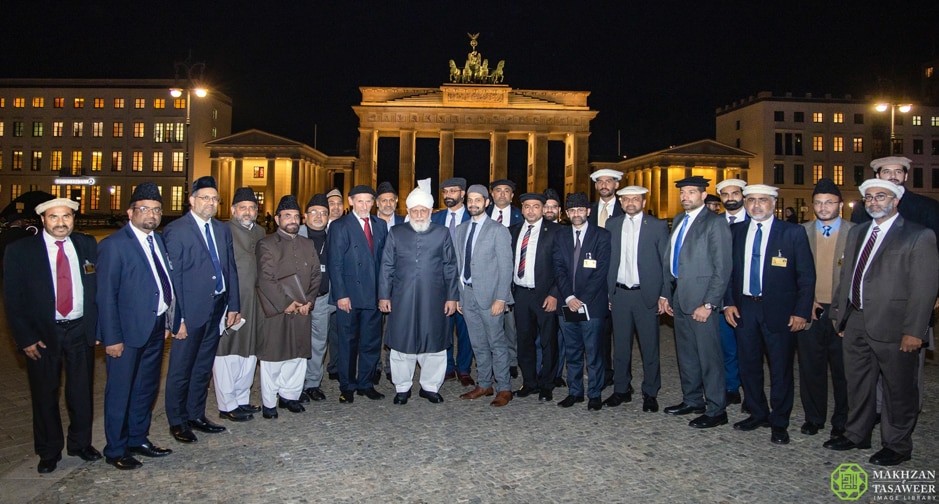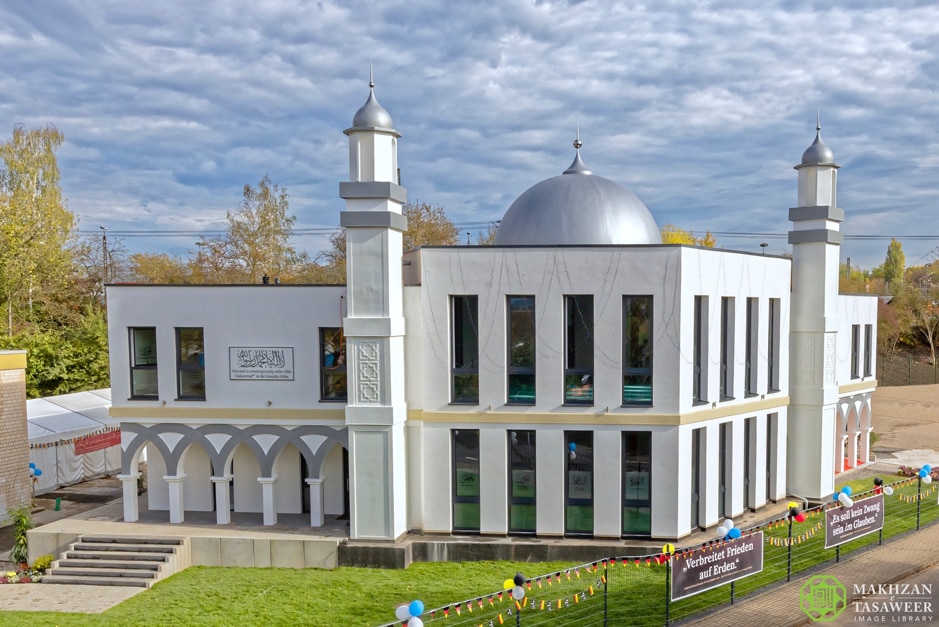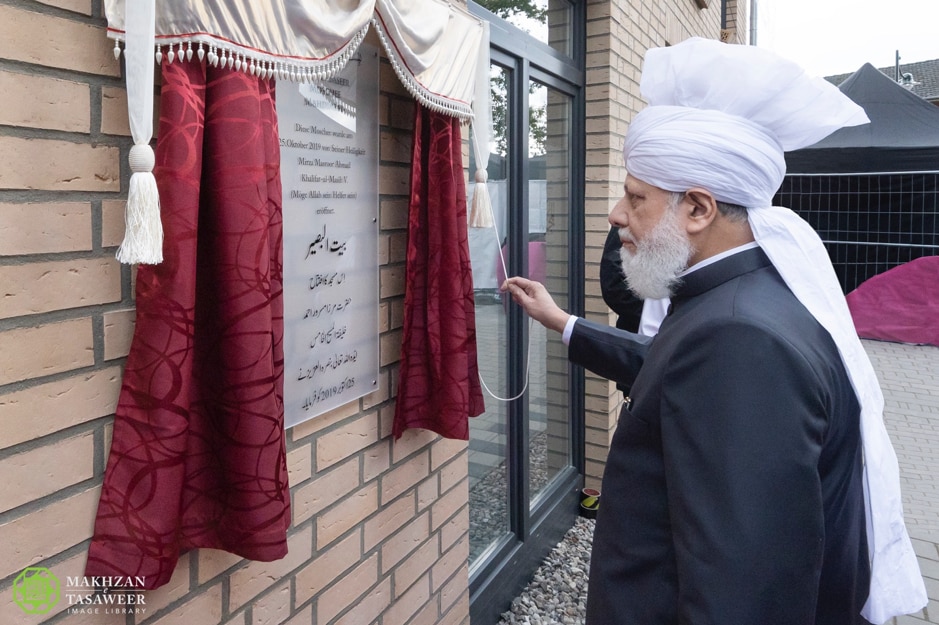
Talk of A ‘Clash Of Civilisations’ Between Islam And The West Is Extremely Dangerous And Irresponsible – Head of The Ahmadiyya Muslim Community
- Hazrat Mirza Masroor Ahmad delivers historic address in German capital
- His Holiness says that atheism is undermining Western traditions and heritage
- Caliph says Islam is no threat to Western civilisation
- Muslim leader condemns modern day ‘economic slavery’ and warns of risk of nuclear warfare
On 22 October 2019, the World Head of the Ahmadiyya Muslim Community, the Fifth Khalifa (Caliph), His Holiness, Hazrat Mirza Masroor Ahmad delivered a landmark and historic address in the heart of Berlin, entitled ‘Islam and Europe: A clash of civilisations?’
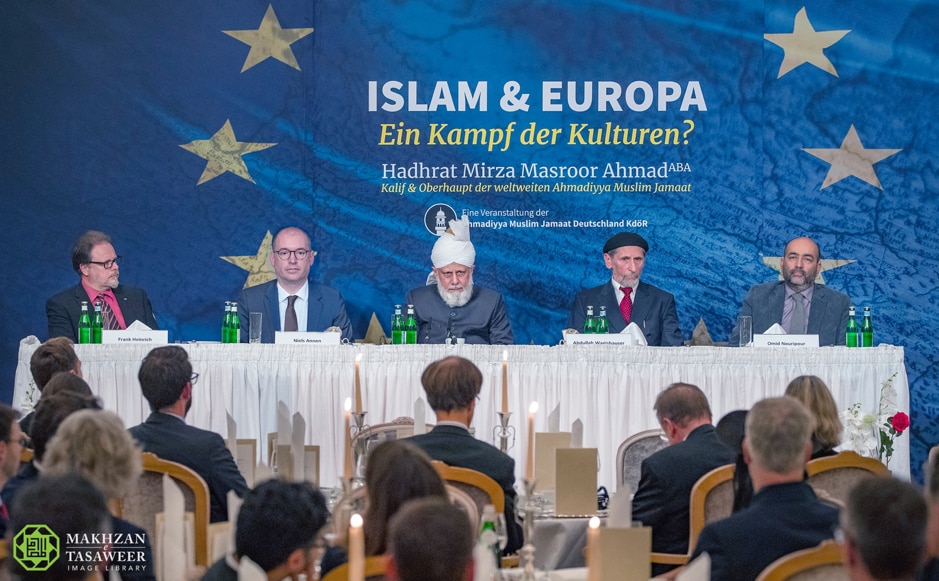 Three decades after that famous symbol of division, the Berlin Wall was knocked down, His Holiness urged today’s leaders and governments to demolish the walls of hatred and conflict that have plagued modern day society.
Three decades after that famous symbol of division, the Berlin Wall was knocked down, His Holiness urged today’s leaders and governments to demolish the walls of hatred and conflict that have plagued modern day society.
Speaking to an audience comprising more than 80 dignitaries and influential guests, including Members of the Bundestag (Parliament), diplomats, academics, faith leaders and representatives of the media, whilst standing just a few hundred metres from the Brandenburg Gate at the Adlon Kempinski Hotel, His Holiness addressed head-on the common allegation that the presence of Islam and Muslims was a threat to Western civilisation and culture.
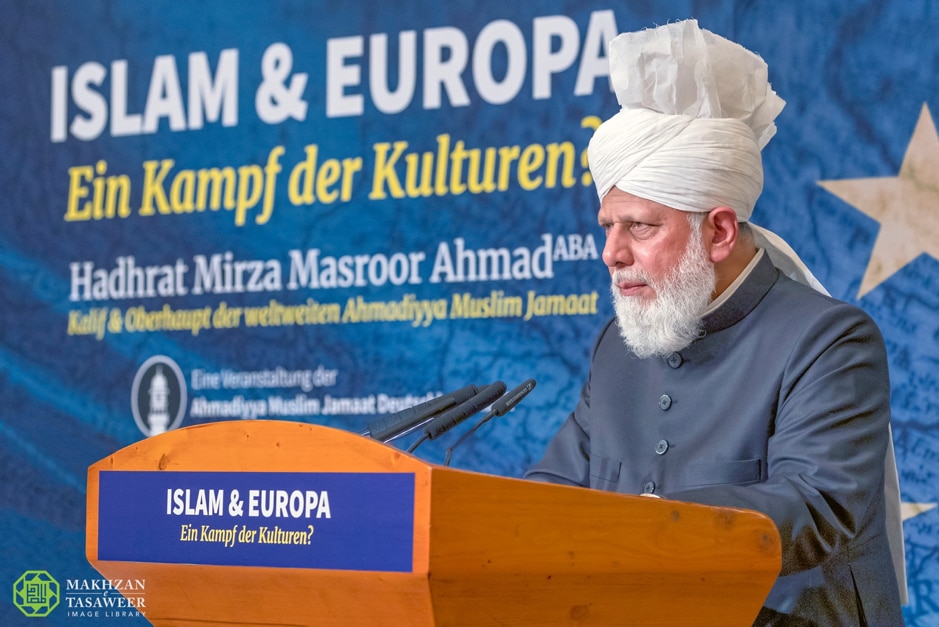
In a powerful defence of Islam and religion itself, His Holiness stated that atheism and Godlessness were the real threat to Western heritage and civilisation and they were leading to centuries-old customs and values being suddenly abandoned without pause for thought.
His Holiness defined ‘civilisation’ and ‘culture’ from an Islamic perspective and used verses of the Holy Quran and the personal example of the Prophet of Islam (peace and blessings be upon him) to counter suggestions that Islam had no place in the West or in modern society.
His Holiness refuted allegations that Islam was a ‘misogynistic’ religion and also condemned what he referred to as ‘economic slavery’, whereby rich and powerful countries were using their wealth and military power to dominate weaker nations.
At the outset, His Holiness spoke of heightening tensions and fears in the Western world due to the migration of large numbers of Muslims to Western countries.
Hazrat Mirza Masroor Ahmad said:
“In the world today, particularly in Western and developed nations, there is a great deal of heated debate about immigration and its effect on societies. Much of the debate centres around Muslims. Certain governments and members of the public fear a ‘clash of civilisations’ and believe that Muslims are a threat to their society and cannot integrate into the Western world.”
His Holiness proceeded to define ‘civilisation’ and ‘culture’ according to Islamic principles.
Describing ‘civilisation’ as the ‘material progress and development of a society’, Hazrat Mirza Masroor Ahmad said:
“Factors that indicate the strength of a civilisation include its economic progress, the level of technological innovation, the advancement of the means of travel and communication and the intellectual progress of the society. Furthermore, the efforts of a nation to foster peace and stability, whether by virtue of its law enforcement and military proficiency or by other means is also a measure of its civilisation.”
Differentiating between ‘civilisation’ and ‘culture’, Hazrat Mirza Masroor Ahmad said:
“Separate and distinct from civilisation is a nation’s ‘culture’. Culture is a manifestation of the views of a people, their attitudes towards social issues and their practices and, instead of being based on material progress, culture is rooted in morality and the religious values and traditions of a nation.”
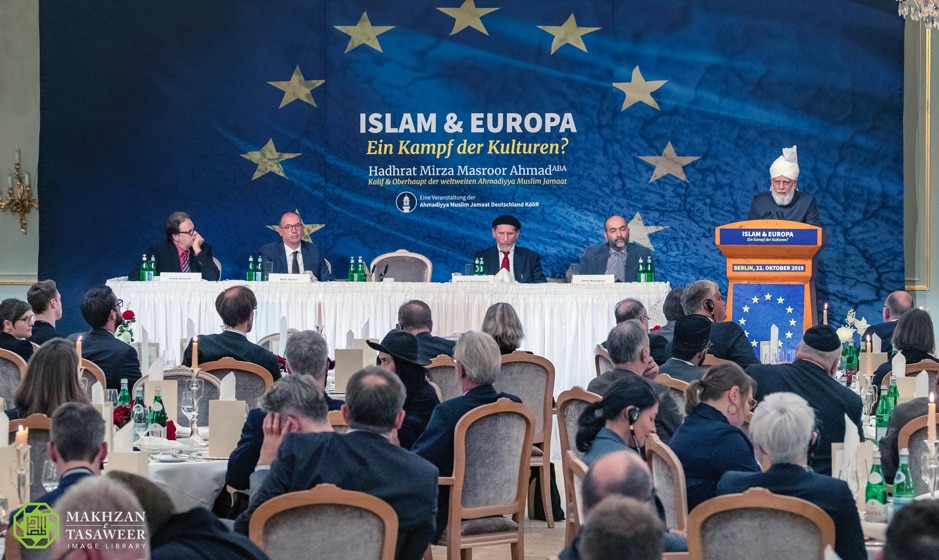
Hazrat Mirza Masroor Ahmad continued:
“Thus, civilisation is the material, technological and intellectual development of a society, whereas its culture is based on the religious, moral and philosophical make-up of that society.”
His Holiness cited the historical example of the Roman Empire and the early period of Christianity to explain what distinguished a civilisation from a culture.
Hazrat Mirza Masroor Ahmad said:
“Due to their material prosperity, urbanisation and the way its territories were governed, the Romans were considered to be tremendously civilised and educated. However, their sophistication did not equate to higher standards of morality.”
Hazrat Mirza Masroor Ahmad continued:
“Rather, it was during the early period of Christianity that their people were infused with a progressive culture. Christianity gave people guiding principles based on religion and morality, whilst the Romans prescribed worldly laws and limits… Hence, the progress and advancement of the Romans reflected their great civilisation, whereas Christianity gave the people a laudable culture.”
His Holiness said it was when the Romans accepted Christianity that their great civilisation fused together with a great culture and that period laid the foundation for the values that continued to underpin Western society.
Contrary to popular opinion, His Holiness said that Muslims had no desire to target or undermine Western civilisation.
Rather, Muslims sought to emulate the material and technological advancement of the West.
Hazrat Mirza Masroor Ahmad said:
“Rather than Western civilisation being cast aside, we are seeing the opposite. Due to the modern means of travel and communication, the world has become a global village. The advent of television, the mass media and particularly the internet have meant that nothing now remains hidden in the world and so people who live in economically deprived countries can see how those in affluent nations live. They are being influenced by Western civilisation and desire to attain similar levels of material advancement and innovation.”
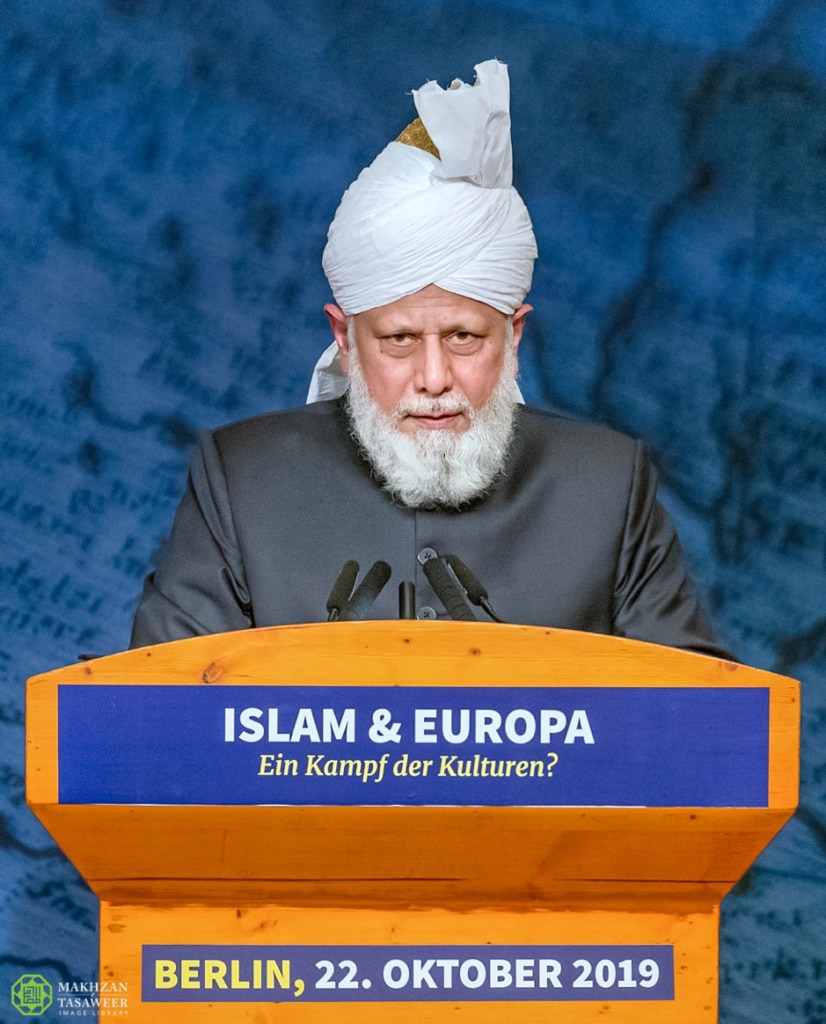
Hazrat Mirza Masroor Ahmad continued:
“Thus, the assertion that Western or European civilisation is threatened by the presence of Muslims does not hold water. Rather, Western civilisation is influencing other parts of the world and this includes the Muslim world.”
After stating that the Western civilisation was under no threat, His Holiness said a fear that Western ‘culture’ could be challenged by Muslims was a more rational or ‘legitimate’ fear. Thereafter, His Holiness cited various verses of the Holy
Quran and examples of the Prophet of Islam (peace and blessings be upon him) to nullify such concerns.
In a formidable defence of religion and Islam, His Holiness stated that religion was the basis of Western culture and so it was the continued ascent of atheism and disbelief that was changing society, rather than immigration of Muslims.
Hazrat Mirza Masroor Ahmad said:
“In Western countries, whenever a census is conducted it shows that people are less and less inclined towards religion or belief in God. Given this, I believe that the rapid increase of atheism is a far greater threat to Western culture than Islam.”
Hazrat Mirza Masroor Ahmad continued:
“Western values are centuries-old and are based upon its religious traditions and especially on its Christian and Jewish heritage. However, these religious values and cultural norms are under attack from those who oppose all forms of religion and faith.”
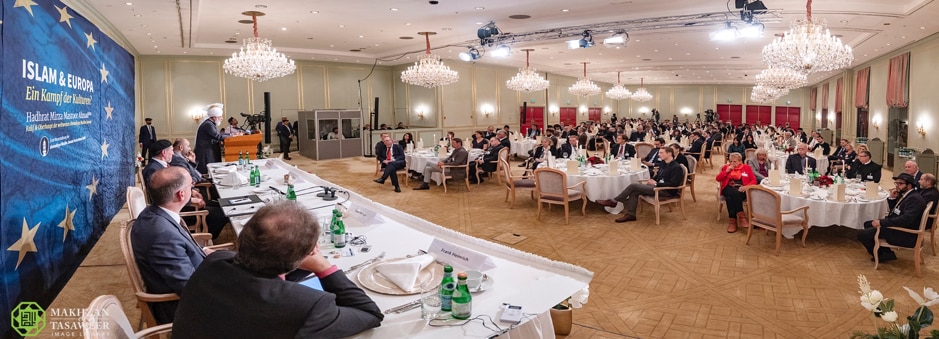
His Holiness called on Western leaders to protect and preserve their religious identity.
Hazrat Mirza Masroor Ahmad said:
“As a Muslim religious leader, I believe you should protect your heritage and culture by focusing your energies on arresting the decline in religion and bringing people back towards faith and belief – whether that be Christianity, Judaism or any other.”
Hazrat Mirza Masroor Ahmad continued:
“It should not be that in the name of ‘advancement’ those values and moral standards that have been part of society for many centuries are suddenly abandoned.”
His Holiness quoted various verses of the Holy Quran that affirmed the great significance and importance of human rights. He said that Islam defended the rights of women, vulnerable members of society and sought to abolish slavery from the outset. Furthermore, freedom of belief was a cornerstone of the Islamic faith.
Hazrat Mirza Masroor Ahmad said:
“In chapter 2, verse 257, the Holy Quran has categorically stated that there should be no compulsion in matters of religion. Therefore, there is no need for non-Muslims to fear that Muslims will try to forcefully spread their beliefs or impose their views on this part of the world. The hateful ideology of the tiny minority of so-called Muslims who have adopted extremism bears no correlation with the teachings of the Holy Quran.”
Hazrat Mirza Masroor Ahmad continued:
“In terms of the Ahmadiyya Muslim Community, we believe that under no circumstances does Islam permit the use of force or any type of coercion in the spread of faith. Why then is there a need to fear Islam? Why do people think that their civilisation or culture is at risk from Muslims?”
His Holiness also spoke about growing inequalities within societies and said that providing education was necessary to redress the imbalance and to ensure social harmony.
Hazrat Mirza Masroor Ahmad said:
“We believe that one of the key ways to help the poor is through education. If younger members of society, who are from broken homes or who are stricken by poverty, are educated it will enable them to break free from the shackles of destitution.”
Hazrat Mirza Masroor Ahmad continued:
“Opportunities will open up to them and so, free from frustration and resentment, such youths will grow to be productive members of society, rather than being lured towards a life of crime or gang culture.”
At an international level, His Holiness said it was in the interests of affluent countries to aid and support weaker countries.
Hazrat Mirza Masroor Ahmad said:
“We also believe that rich countries should help the weaker nations of the world build solid foundations. If poorer countries can build up their economies and infrastructures their people will have opportunities at home and have far less reason to migrate abroad. If their nations are stable and prosperous, it naturally follows that the region and the wider world will benefit.”
This was a theme His Holiness returned to later in his address, when he spoke of economic slavery having replaced the horrors of physical slavery in the modern world.
Hazrat Mirza Masroor Ahmad said:
“In today’s world, physical slavery no longer exists, but it has been replaced by economic bondage and servitude, wherein the relationship between the most powerful nations on earth and weaker countries has become akin to the relationship of a master and a slave.”
Hazrat Mirza Masroor Ahmad continued:
“For example, ‘loans’ disguised as ‘aid-packages’ are given by rich countries to weaker nations who have no option but to accept whatever strings are attached. Invariably, the crippling levels of interest mean that the short-term loans lead to long-term misery and liability. The end result is that the defaulting country has no choice but to bend to the will of the dominant nation. Such slavery is utterly immoral.”
Regarding women’s rights, His Holiness pointed to the fact that various studies and official reports produced in the West proved that the majority of cases of domestic abuse and crimes against women were being perpetrated by non- Muslims. To the contrary, Islam taught Muslim men to respect and value women and provided equal opportunities for education between the sexes.
Hazrat Mirza Masroor Ahmad said:
“Another very common allegation in the Western world is that Muslims do not respect women or their rights. First of all, it should be noted that Islam was the first religion to give women the right to inherit, the right to divorce and various other rights. In addition, Islam emphasises the vast importance of educating girls and giving them opportunities for personal growth and development.”
Hazrat Mirza Masroor Ahmad continued:
“Moreover, in a famous saying, the Holy Prophet of Islam (peace and blessings be upon him) said that ‘Paradise lies under the feet of one’s mother’. These words illustrate the momentous role women play in society and their unique and distinguished status in society… Thus, it is entirely unjust to brand Islam as a misogynistic religion.”
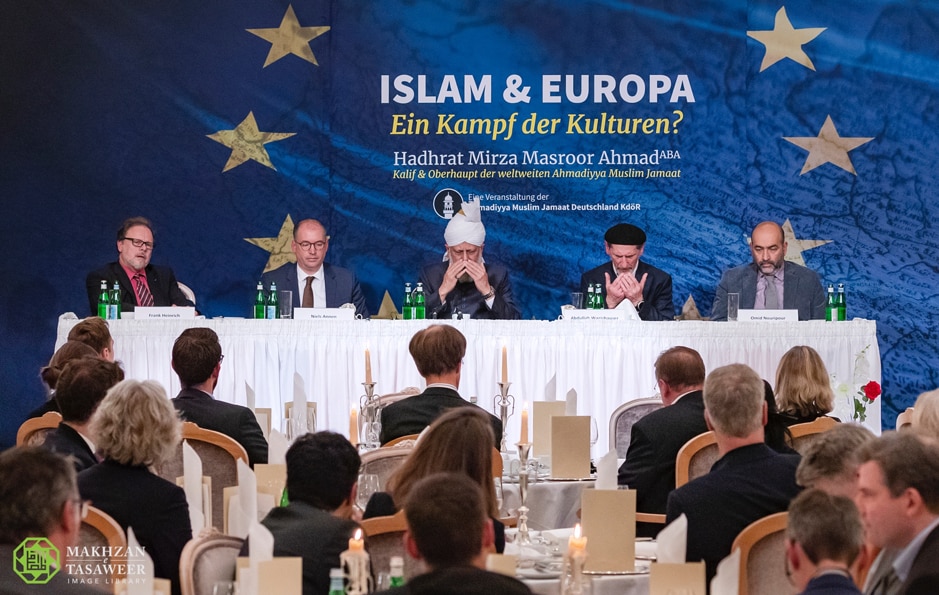
After explaining that Jihad had been entirely misconstrued by much of the modern media and by those who opposed Islam, His Holiness presented the incomparable example of forgiveness and forbearance manifest by the Holy
Prophet Muhammad (peace and blessings be upon him) at the time of the Victory of Makkah.
Thereupon, His Holiness concluded by calling on nations of the world – their leaders and the members of the public – to set aside differences and to forge bonds of unity.
As he stood in the epicentre of that city where a great physical divide existed for decades separating a nation and standing as a symbol of a far greater divide in the world, His Holiness called for peace through unity and justice.
Hazrat Mirza Masroor Ahmad said:
“People must realise that words can have far-reaching consequences and so rather than speaking of a ‘clash of civilisations’ or needlessly ratcheting up tensions between different communities, people should refrain from attacking the religious teachings of one another.”
Hazrat Mirza Masroor Ahmad continued:
“Instead of seeking to place restrictions upon the expression of faith, we should recognise that we are all part of one human race more connected than ever before. We should embrace our diversity and focus on establishing unity so that long-term peace can develop in the world.”
His Holiness expressed his grave fears that failure to join together in peace and a failure to respect one another could prove the catalyst for an unthinkable catastrophe whose consequences could last for generations.
Hazrat Mirza Masroor Ahmad said:
“Reminiscent of the dark days of the past, opposing blocs and alliances are forming and it seems as though the world is hell-bent on inviting its destruction. Today, there are a host of countries who have acquired nuclear bombs or other destructive weapons that have the potential to destroy civilisation as we know it.”
Hazrat Mirza Masroor Ahmad continued:
“If nuclear weapons are ever used it will not just be us who bear the consequences, rather our children and future generations will have to suffer for our sins. Generations of children will be born with intellectual and physical disabilities and have their hopes and dreams shattered through no fault of their own. Is that the parting legacy we wish to bequeath to those who follow us? Surely not!”
Concluding, Hazrat Mirza Masroor Ahmad said:
“Let us all, irrespective of our differences, join together and work with a spirit of mutual respect, tolerance and affection for the peace of the world and to promote freedom of belief.”
Prior to the keynote address, several distinguished speakers took to the stage and spoke of their admiration of the Ahmadiyya Muslim Community and its efforts to propagate Islam’s message of peace across the world, as well as its commitment to serving humanity.
Abdullah Wagishauser, National President of the Ahmadiyya Muslim Community in Germany, welcomed the guests and provided an introduction to the Ahmadiyya Muslim Community and its history in Germany.

Frank Heinrich (CDU Party), Member of Parliament, said:
“Everyone should have the chance to practice their own religion everywhere. And that is why you have us in the Bundestag on the side of your movement.”
Omid Nouripour (Green Party), Member of Parliament, said:
“The Ahmadiyya Muslim Community is a wonderful community who do a lot of good work in their regions. We have also gathered to thank you here for your excellent work.”
Niels Annen (SPD Party), Minister of State at the Federal Foreign Office and
Member of Parliament, said:
“In 1949 the German constitution was promulgated and it is the constitution that provides us the lawful fundamentals for our democracy and for the religious freedom… In the same year a German radio station broadcasted a lecture of Sheikh Nasir Ahmad, who lived at that time in Switzerland as an Imam of the Ahmadiyya Muslim Community. Why am I mentioning it? Because that was the first programme on German Radio about Islam and this illustrates the long-standing connection of the Ahmadiyya Muslim Community to Germany.”
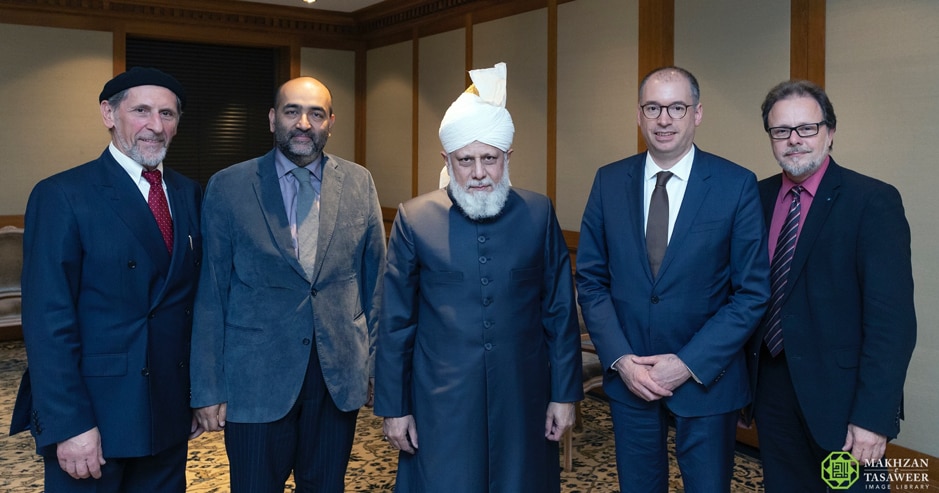
The event concluded with a silent prayer led by His Holiness.
Following the event His Holiness met personally with many of the guests, whilst prior to it, the three guest speakers had the opportunity of a meeting with His Holiness.
During the meeting, they praised the continued commitment of the Ahmadiyya Muslim Community to peace and inter-faith dialogue.
Upon the conclusion of proceedings, His Holiness proceeded towards the Brandenburg Gate where he stood for a memorable photo with his entourage who had travelled with him from England, as well as some members of the Ahmadiyya Muslim Community in Germany.
